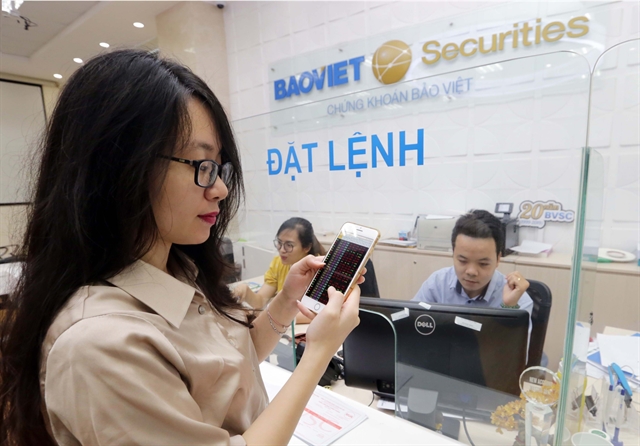 Economy
Economy

 |
| Vũ Chí Dũng, Director General of the International Cooperation Department under the State Securities Commission of Việt Nam (SSC). — VNS Photo Ly Ly Cao |
HÀ NỘI — Market upgrading is a complex and time-consuming process that demands substantial effort to instigate internal capacity enhancements and legal policy reforms.
Recent undertakings have been distinctly illustrated by the elimination of the pre-funding requirement for foreign investors before placing orders.
Việt Nam News reporter Ly Ly Cao spoke to Vũ Chí Dũng, Director General of the International Cooperation Department under the State Securities Commission of Việt Nam (SSC) for further insights.
What impact does the easing of pre-funding regulations for foreign investors have on upgrading the Vietnamese stock market?
This change primarily affects institutional investors, particularly those from abroad who engage in various markets, predominantly professional ones. As a result, they will compare transaction costs across markets. The relaxation of the pre-funding requirement will streamline operations for foreign investors in the Vietnamese stock market.
While this alteration undoubtedly positively influences the upgrading of the Vietnamese stock market, it remains insufficient. Further time and adjustments are necessary for continued progress.
In the near term, what strategies does the regulatory authority have in place to enhance the status of the stock market?
SSC has recently joined forces with the Japan International Cooperation Agency (JICA) to bolster efforts aimed at enhancing the efficacy of the stock market.
This initiative is specifically designed to strengthen transparency within the stock market, particularly emphasising equities. It includes initiatives to refine listing standards, disclosure norms and aid the SSC in reinforcing the legal framework concerning information disclosure and monitoring of listed entities.
Concurrently, it seeks to propel research and evaluation processes related to issuance profiles, prioritising qualitative assessments to meet overarching requirements and aligning with information disclosure mandates and general market monitoring within the country’s stock market.
As the collaboration progresses into its second phase with JICA, the spotlight will shift towards augmenting the capacities of regulatory bodies, encompassing intermediary institutions, operational entities, stock exchanges and investor education.
Ensuring market transparency, especially for foreign investors, and providing insights into market management practices during trading, as well as safeguarding corporate information crucial to foreign investors' capital allocation decisions during market upgrades, are of paramount importance.
The objective extends beyond mere market stability to encompass the preservation of foreign investor confidence amid market upgrades while simultaneously attracting fresh investment interest, including from those eyeing nascent market segments.
How will the market benefit from the upgrade, particularly in terms of privatisation and divestment processes involving State-owned enterprises?
Once the market is upgraded, the results are far-reaching. It's not just about a surge in capital from passive investment funds finding their way into the market. It's also about active investment funds and significant global investors, including private equity entities focused on investing in privatised and yet-to-be-listed companies, stepping into Việt Nam’s capital market.
These investors are poised to diversify the investor landscape, injecting fresh capital to better propel Việt Nam towards its privatisation objectives, particularly concerning sizable State-owned enterprises.
Moreover, the expanded and refined stock market will act as a magnetic hub for capital-raising endeavors, attracting a broad spectrum of entities, from innovative start-up ventures to small and medium-sized enterprises, and even large unlisted corporations, facilitating initial public offerings (IPOs) and listings for divestment on the stock exchange.
The process of raising capital through IPOs and listings on the stock exchange has proven to be highly efficient, yielding substantial returns. Consequently, a listed stock market not only enhances the allure of the equity capital market but also enriches the landscape of the burgeoning start-up ecosystem.
An upgraded stock market doesn't just channel funds towards listed companies, it also beckons investments into the unlisted equity market. This upgrade directly contributes to elevating the standards of Vietnam's equity capital market, attracting larger capital inflows, and elevating both the quantity and quality of equity investors participating in Vietnam.
These advancements are well-aligned with the overarching goals of initiatives supporting the national startup and innovation ecosystem, as outlined in the Prime Minister's Decision No. 844/QD-TTg dated May 18, 2016.
What steps should listed firms take now to access sustainable funding from domestic institutions and international sources?
When it comes to securing green funding, businesses must first establish a clear understanding of what green capital entails.
To qualify for green funding, which involves using funds for environmentally friendly purposes, listed companies need to meet specific standards, including industry and regional criteria. Based on their capital requirements, companies and projects seeking access to green funding must decide which framework best suits their needs.
In the case of large-scale projects that require not only financial support but also advanced technology, businesses will opt for green funding from regions that offer technologies aligned with their project requirements.
In essence, businesses should develop frameworks for green finance and financial instruments. When planning to issue new securities and raise capital, companies need to define how funds will be disbursed to ensure alignment with their objectives.
Listed companies are obliged to disclose information regarding their capital utilisation plans and the progress of fund deployment to ensure that the disbursed funds are used as intended, providing investors with crucial insights.
Through these measures, investors are encouraged to remain engaged with the company, fostering a transparent trading environment with detailed information on financial transactions, thereby enhancing liquidity in the financial sector.
These coordinated efforts mutually support each other, retaining existing investors and attracting new ones by offering comprehensive information. Importantly, they contribute to the nation's overarching goal of carbon neutrality, playing a role in advancing Việt Nam's sustainable growth through private sector involvement. — VNS




